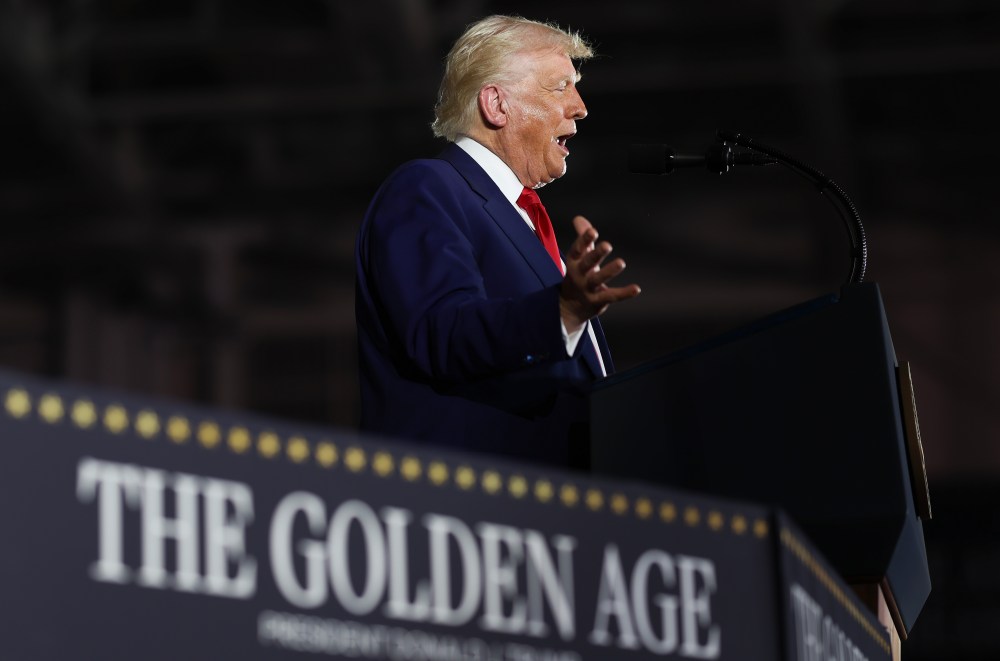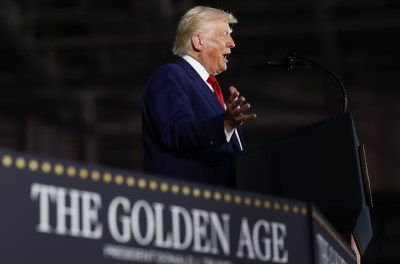Republicans have a weird new proposition for the American voter: fewer choices, higher prices.
That doesn’t seem like an obvious political winner.
As they say over at The Economist podcast: But, first ...
I don’t care very much about “Made in the USA.” I do care a good deal about “Made in China.”
Because I am interested in trade issues, I pay attention, probably more than the average person does, to where the consumer goods I buy are made. Consumer goods are only a small part of international trade, of course—one of the reasons Americans’ have warped views of trade is that they see “Made in China” on cheap bicycle pumps at Walmart but they don’t see “Made in the USA” on the custom-machined titanium parts used in medical devices and aerospace equipment, and they don’t think about our enormous trade in services. They just see some $4 flip-flops and think about how the Chinese are stealing all of our good jobs at the $4 flip-flop factory.
My flip-flops were made in Italy, another example of the American worker being undercut by low wages and terrible working conditions in ... an advanced European democracy with a high standard of living.
Well.
I’m neurotically picky about ... objects in general, really, but take tools for example. I’m not out there framing houses on the weekends or rebuilding the engine on a 1966 Volvo P1800 (once was enough, I think), but I do the regular things around the house, and I do a bit of work on my guns from time to time. As a rule, I try not to do anything that isn’t: 1) paying work or 2) fun. And I don’t know about you, but I enjoy doing manual work a lot more when I have good tools that I enjoy using. It doesn’t matter if it’s too much tool for the job—in fact, it’s all that much better if it is. Tools, rifles, guitars—I don’t have the skills to justify the implements in any of those cases, and I don’t really need an F-250, either. But the day-to-day stuff and my hobbies are a lot more fun that way. Life’s too short not to have a really good set of screwdrivers.
Whether it is capital goods or consumer goods, American firms tend to thrive at the higher end of the market: If you have the means and the inclination to spend $245 or more on your button-down shirts or $500 on your jeans, there are a lot of good made-in-the-USA options. From suits to tools to furniture, you can have it made in the USA—but that usually comes with a price premium.
And, of course, “Made in the USA” can be slippery: You can buy some really nice jeans made in Los Angeles—out of Japanese fabric; or you can buy some really nice jeans made in Mexico—out of American fabric. There are a lot of cowboy-boot factories in Texas, some of them right near the border, which seems fitting—but there also are some pretty good ones on the south side of the river, which seems to me about equally fitting. I myself prefer Rios of Mercedes to Tecovas, but I’m not offended by the notion of boots made in León, Mexico, which is a hell of a long way from the Chinese shoe capital of Jinjiang.
It will not surprise many readers to know that I can be a little obsessive about this stuff, and I put way more effort into choosing a snow shovel or a pair of pliers (or a pair of boots) than your average normal, well-adjusted, adult-type, American male typically does—and your average normal, well-adjusted, adult-type, American male is far from indifferent to these things. I am a free-trade guy, but that doesn’t mean that I am indifferent to where my stuff comes from—it means that I want to make my own decisions rather than having some gormless ignorant feckless knucklehead in Washington choose for me under the influence of whichever influential business lobby has his boss’ ear today.
Which is a long way of saying that I have gone way far out of my way—and have spent a good deal of extra money—to get my hands on screwdrivers and other common tools that are not made in China. “Made in the USA” is fine with me—but so are tools made in Japan or Germany (both home to some superlative toolmakers) or Switzerland or Canada. I want good stuff that I feel good about. China isn’t just cheap stuff, of course: Among the businesses that intersect with my interests, the luthier Yulong Guo is a fine example of high-end Chinese craftsmanship. And I’m sure he’s a fine guy who does business with as much integrity as is possible in a single-party police state.
But, there’s that single-party police state to think about. I am of two minds about China trade. On the one hand, I think that the world and its people are, on balance, better off with a prospering China—even given the character of its government—than with a poor and desperate China. On the other hand, the old liberal assumptions about economic liberty dragging autocratic regimes toward political liberty have been disappointed, and that dynamic has turned out to be much more limited and less robust than we had hoped. China’s little dollops of economic liberalism have made an enormous difference in the standard of living of Chinese people—little dollops of liberty can do a lot—but Chinese nationalism and Chinese ethnocentrism are very real, powerful, organic forces, not merely policy choices and political weapons wielded by the Communist Party. I do not think China is unreformable, but it is, to a great degree, unreformed.
But maybe I’m also just a happiness-maximizing Homo economicus, and I feel better about my shoes and bedsheets and wrenches if they are not made in China. I don’t really have a lot of conflicted feelings about Japan or Germany—I’m an American, so my real sense of history is pretty short. People in India are still fighting over real estate disputes from the 16th century, but I don’t have that kind of energy.
My friend Jay Nordlinger tells the story of his effort to personally boycott China, which lasted about 48 hours. It is difficult to avoid Chinese-made stuff. And I am not a fanatic about it. Without looking, I’d guess that I have some gym socks and plastic containers and trashbags and whatnot of Chinese origin. I’m not going to go around—“with my hair on fire” is the conventional expression, but that feels wrong—all bent out of shape about it.
The thing about avoiding Chinese-made goods is, it can be expensive. You’re in the market for an American-made hammer? Great. Are you in the market for a hammer that costs $300? Not every made-in-the-USA tool is ten times the price of a Chinese alternative–there are less expensive U.S.-made hammers–but, as noted, American manufacturers tend to be most competitive at the high end.
The same is true for a lot of other rich countries, too.
Nobody is going to cry very much for the customers when they read that, in response to the tariffs, Rolex is raising its prices in the United States. But think also of the people who work in the Rolex shops, who are not typically as wealthy as their customers—those authorized dealers are taking a haircut, too, with Rolex forcing them to accept lower margins on their sales. (Authorized dealers of products of this kind have little or no discretion in pricing—that is one of the reasons for controlling retail sales through authorized dealerships.) The whole Swiss watchmaking industry is going to get walloped pretty good, and that doesn’t only affect their rich-guy customers. (Rolex is a weird case—it is owned by a charity, the Hans Wilsdorf Foundation.) It doesn’t only affect people living around Geneva, either: American shopping districts are full of boutique owners and shop clerks and other people whose livelihoods depend on those margins.
Do you know which country is the state of Nevada’s largest trading partner? In many years, it is Switzerland. (Sometimes it is Canada, as it was last year.) And that isn’t the result of all those high-priced timepieces sold to people who hit a big jackpot at the Bellagio. Nevada is a major exporter of precious metals, and the Swiss, who like to keep plenty of gold and silver in their reserves (and use some to make watches and such), buy a lot of it. In many years, precious-metals exports to Switzerland account for nearly a third of Nevada’s outbound trade. Fewer U.S. dollars flowing from the watch boutiques to the Swiss headquarters in Plan-les-Ouates and Le Brassus means fewer dollars available for the Swiss to spend with Nevada miners in Elko and Humboldt County. I don’t know if you’ve been to Elko, but it isn’t Beverly Hills.
Tariffs are a tax on U.S. consumers and, indirectly, on the entire broader economic ecosystem entangled with imports and exports—which is to say, the whole U.S. economy, from the rich guys buying the $500 bottles of French wine to the middle-class guys who own the shops to the lower-income people who clean those shops at night. When an economic airhead such as Donald Trump says the little girls are going to have only two dolls instead of 30, he’s thinking about people like me, with my German-made driver bits—people who have some resources and a lot of options. But for the shop clerks and laborers and warehouse workers and truck drivers, this isn’t about buying one fewer pair of Italian loafers this year. Every extra dollar that has to be spent on shoes for the kids is a dollar out of the rent budget, the medical budget, the retirement-savings budget. And, yes, even the doll budget, which some people are going to care a great deal about around Christmas and birthdays.
“Maybe the two dolls will cost a couple of bucks more than they would normally,” Trump says. Not a big deal for me. A heck of a lot less of a big deal for him. But have you ever met a waitress who didn’t care about an extra couple of bucks? A home-health aide? An Uber driver? A college student? A suggestion for all you hard-charging nationalists out there in the suburbs: Spend five minutes with the guy who cuts your grass sometime and maybe open your ears and listen for a change.
But what about those factory jobs we’re protecting? Weird thing about those factory jobs: We got ’em, nobody wants ’em. We just have a lot of people who like to talk about them.
The United States had nearly 500,000 unfilled manufacturing jobs as of April, and there isn’t anybody named Trump lining up to get them. J.D. Vance and these insipid Fox News mouthholes are not going to send their children and grandchildren to work in a tire factory in central Georgia—or in a Nevada mine. It’s all bluster and bull and salesmanship.
What’s ironic—and ironic is not a synonym for stupid, though this is also stupid—is that Donald Trump got back into the White House in 2024 largely because of inflation, his poll numbers rising with the price of eggs. And now this ignoramus is not only making inflation worse—he is arguing that inflation is now a good thing. Republicans and the right-wing media, who are nothing if not craven, are marching in lockstep with him. Suddenly, we have Republicans talking like Bernie Sanders, turning their little pink noses up at consumerism. “Don’t we all have too much stuff?” they say. And I’m all for the “fewer, better things” business—but I am not in favor of taxing poor children out of their shoes because a couple of rich [expletive deleted] media personalities and a bevy of [expletive deleted] Washington lawyers and hopeless [expletive deleted] political hacks need to clean out their [expletive deleted] closets.
You [expletive deleted] fools.
Tariffs raise prices in two ways: through the tax itself and by disrupting supply chains. Prices can adapt relatively quickly to changes in taxes, but those supply-chain disruptions can be a bigger deal. UPS, which wasn’t exactly wringing mad profits out of its relationship with Amazon, sees the writing on the wall: Tariffs are going to jack up Amazon’s expenses, and Jeff Bezos didn’t get to be the once-and-future richest man on Earth (currently No. 2) without having a knack for passing on costs. So UPS is significantly cutting back that part of its business—and closing 73 facilities, eliminating more than 20,000 jobs.
With the caveat that he did try to overthrow the government the last time voters gave him the boot, Donald Trump is not going to be in office forever. And there is a good chance that his idiotic tariff misadventure will come to an end even before he leaves office. But once UPS has cut those jobs and closed those facilities, it’s not like CEO Carol Tomé can just snap her fingers and restore the status quo ante. There are transaction costs involved, and once that customer center has been turned into a nail salon or whatever, it’s off the market. Those workers will, in most cases, have moved on.
Transaction costs are a thing. If Apple has to work out a less-efficient supply chain in order to accommodate the dumbest instinct of the worst people in U.S. politics, it may end up stuck with that inefficient supply chain for a long time—because there are costs involved in going back to the more efficient one, which may not even be possible to do.
And those newly unemployed UPS workers in West Jacksonville? Go tell them that their kids will have to get by with fewer toys this Christmas, and that it may cost them a few bucks more. I wonder what they’ll say.
What’s going on at UPS and at Amazon is also going on in thousands upon thousands of other businesses, from global giants to local shops. And that is where put-the-best-possible-spin-on-it turd-polishers such as Marc Thiessen of the Washington Post get it wrong: Thiessen, hilariously, has held out the proposition that Trump “could end up the greatest free-trade president in history,” provided—the willful naïvety here is very difficult to take with a straight face—that Trump’s chaotic ad-hoc-i-licious tariff assault is just a negotiating tactic deployed in the service of “the reduction or elimination of trade barriers to U.S. exports in as many as 75 countries.” That’s horsepucky on its face, but it also elides an important issue: We could drop all the tariffs tomorrow, and our trading partners could do the same, but the damage would already be done: Logistical and business-development decisions, and the investments to support these, will for the foreseeable future have to be made with the knowledge that the United States is always one dodgy Big Mac away from sliding into some kind of gilded autarkic Juche-by-way-of-Lee Greenwood crusade to set fire to the global trading order.
And while Trump has at times made vague gestures in the direction of the kind of trade negotiations Thiessen imagines, our president remains committed to the fallacy that trade deficits are, in and of themselves, an existential economic threat. Policies based on dumb and incoherent half-ideas end up being dumb and incoherent half-policies. Friedrich Merz, Yoji Muto, and Young Liu aren’t going to forget all this nonsense. Neither are David Solomon or Larry Fink. Neither are millions of small investors who have watched queasily as their retirement savings ride the rollercoaster of Trump’s monumental incompetence.
It’s like a star college quarterback who breaks his arm: Maybe he gets better over time, maybe he even ends up ultimately a better player than he was—but he never gets the lost time back, never gets back to the vector of development he’d have been on if not for his injury.
Our economic injury is self-inflicted. And Republicans have been cheering for it. They’re like a bunch of maniacs watching a house fire on Christmas Eve and cheering for the arsonist. The Whigs in 1853 deserved political survival more than the contemporary Republican Party does. The fact that at least a few of them know better makes it even worse.
Americans were cheesed off about egg prices in 2024 and at gasoline prices before that. I don’t imagine that the current Republican offering—“Work more, get less, it’s patriotic and Jesus says so”—will be much better-received in the long term.
Speaking of Turd-Polishing
This lame attempt to apply a little spit-and-shine to a week-old bolus (“Conservatism Needed a Trump Reset”) was by far the dumbest thing I read all week, and it was a dumb week. Writing in the Wall Street Journal, Karl Zinsmeister wrote that Trump’s vandalism is necessary because American “daily life has already been warped.”
Over the past decade, our communities were wrenched by government and cultural manias more controlling, crusading and coercive than anything ever seen in the U.S. The Great Awokening. The Covid lies and lockdowns. The hypocritical exemptions to the pandemic mandates granted for the Black Lives Matter riots. Disturbing new racial and sexual ideologies. Vast expansions of federal spending and power. Political weaponization of the justice system.
More controlling and coercive than anything ever seen in the United States? Because the Red Scare never happened? Woodrow Wilson didn’t send armed goons to attack critics? He didn’t shut down newspapers? Franklin Roosevelt didn’t lock up tens of thousands of U.S. citizens based on their ethnicity? All the chaos of 1968 I’ve read about was ... a conspiracy of historians? More control and coercive than “anything ever seen” in the history of a country that once had chattel slavery?
Oh, but Americans are basically conservative! So Zinsmeister informs us. They’ll want a return to normalcy, and, if they don’t get one, then “the Trump era could end in flaming hubris and overreach.”
The guy tried to overthrow the godd—ned government the last time he lost an election. I suppose that might count as “overreach,” if I’m being persnickety about it.
Words About Words
The Trump administration issued an executive order on Thursday titled: “Ending taxpayer subsidization of biased media.” Subsidization is a common word (dating back to the mid-19th century) but an unnecessary one. Subsidy is already a noun, and what the Trump administration proposes is to end taxpayer subsidy of NPR and PBS. The president has no power to enact or remove any such subsidy absent congressional action, of course.
But, hey, who cares about that anymore?
In Other Wordiness ...
A commenter on X asks: “Would it be possible to have a cabinet meeting without the Kim Jong il-style tributes?”
That’s an excellent question from ... the author of In Trump We Trust, Ann Coulter. What’s a little Nork-style puffery compared to actual idolatry?
One from a Dispatch reader who knows what he is reading. I wrote, “You cannot hate a mosquito—you can only swat him.” What was I thinking?
One very small, nitpicking point: I believe only female mosquitoes bite, or feed. So it probably should say, “—you can only swat her.”
Other readers chimed in with the same fact-check. I stand corrected and delighted.
And here is the New York Times with an error we never shall be rid of: “How an Arkansas City Became an Epicenter of the Biking World.” The story is about the very interesting city of Bentonville, Ark., which is a center of bicycling and an epicenter of nothing in particular.
Elsewhere
You can buy my most recent book, Big White Ghetto, here.
You can buy my other books here.
You can check out “How the World Works,” a series of interviews on work I’m doing for the Competitive Enterprise Institute, here. My most recent interview is with the very interesting proprietor of Nino’s Bakery in Washington, who studied economics at Yale and worked in the Foreign Service before she got big into the croissant game. Good stuff.
In Closing
Rereading this, it does seem to me that I’m a little extra bilious this week. (“Extra?” I can hear my editors asking.) I remember a piece I wrote for National Review years ago in which I introduced some particularly bomb-throwing passage with the words, “Not to put too fine a point on it,” to which my editor, the excellent and brilliant Jason Steorts, replied in the notes: “Mission accomplished.”
I have not put too fine a point on it this week, but, in real life, I’m feeling pretty good: I have four thriving sons and a delightful wife, devoted friends who can take what I often dish out without consciously meaning to, very possibly the best job in journalism, and health that is considerably better than it was a year ago. The sun is shining, and Pancake is having a rumpus on the grass. My country is not in great shape, but I keep in mind the wise words of Irving Kristol, who, upon hearing a lamentation of the headlong decline of Western civilization, said: “It’ll take a long time. Meanwhile, it’s still possible to live well.”
I used to think living well meant a bottle of 1982 Bordeaux. Now, it is getting to sleep before 9 p.m.—almost as rare, I’m afraid, but less expensive. William F. Buckley Jr., a conservative but no Luddite, was tickled by the invention of the compact disc: “Life can’t be all bad when for ten dollars you can buy all the Beethoven sonatas and listen to them for ten years.”
Not all bad? Not bad at all.







Please note that we at The Dispatch hold ourselves, our work, and our commenters to a higher standard than other places on the internet. We welcome comments that foster genuine debate or discussion—including comments critical of us or our work—but responses that include ad hominem attacks on fellow Dispatch members or are intended to stoke fear and anger may be moderated.
With your membership, you only have the ability to comment on The Morning Dispatch articles. Consider upgrading to join the conversation everywhere.